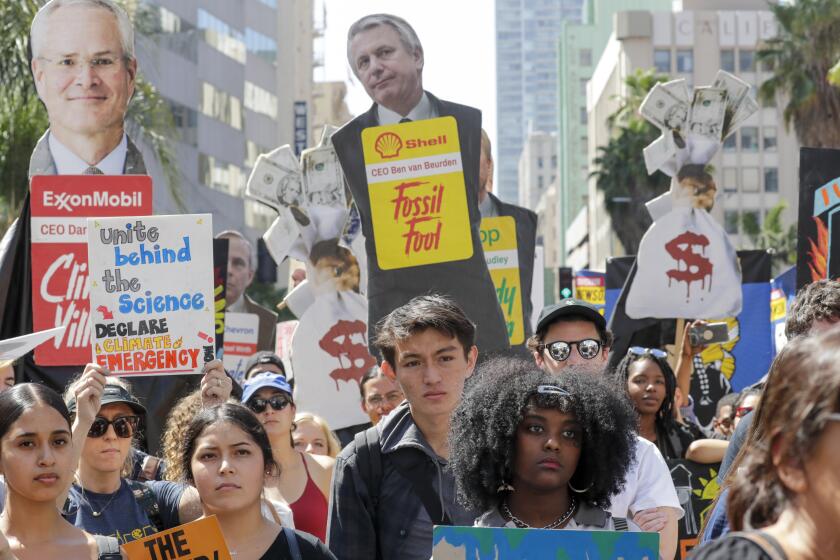Editorial: What’s better than a ban on Russian oil imports? Ending our dependence on fossil fuels

- Share via
President Biden’s announcement Tuesday that the U.S. will ban imports of Russian oil and gas underscores the inherent instability and danger of our reliance on fossil fuels.
Russia’s invasion of Ukraine is fueled by the oil and gas that underpins the Russian economy, and Europe’s reliance on Russian energy hinders its ability to respond. The ban is a righteous move that, in the short term, ensures that Russian President Vladimir Putin does not continue to profit off selling oil to the U.S. and that Americans do not subsidize his brutal war.
The ban should make it clearer than ever how urgently we need to accelerate renewable energy and hasten the end of fossil fuels that empower autocrats and are incompatible with a safe and secure planet.
Europe is far more dependent on Russian oil and gas than the U.S., which gets less than 10% of its imported oil from Russia, and the European Union is already proposing swift action to dramatically reduce its reliance on Russian gas, in part by speeding up the replacement of fossil fuels through renewable energy, electrification and efficiency projects. The U.S. should do the same and respond to this crisis with a leap forward on climate action and an aggressive move to non-polluting energy sources.
As he continues to ratchet up pressure on Russia, President Biden is right to reject actions that would put the U.S. in direct conflict with Russia.
Priority No. 1 has to be salvaging the climate provisions from Biden’s Build Back Better Act, which opposition from West Virginia Sen. Joe Manchin III has all but killed.
The $555 billion for renewable energy and clean transportation in Biden’s proposal includes an increase in the electric vehicle tax credit from $7,500 up to $12,500 for lower- and middle-income families, and a new credit of up to $4,000 for used zero-emission vehicles. These measures, in combination with surging gasoline prices, would make switching to an electric car pencil out financially for many more Americans, including working-class people who have been left behind in the adoption of zero-emission vehicles.
As frustrating as it may be to pass the expansive Build Back Better agenda piecemeal, Biden and congressional Democrats should strike a deal with Manchin, who has repeatedly indicated openness to narrower legislation that would include big spending on climate change and renewable energy. We cannot let the failure of the entire package derail a once-in-a-generation opportunity to take the nation’s biggest step ever to fight climate change.
A new U.N. climate report shows that the effects of climate change are widespread and growing. Further delay consigns us to more death and destruction.
Biden should also find a way to fast-track implementation of the parts of the already-passed bipartisan infrastructure bill that will help cut demand for fossil fuels, including billions of dollars to build up the nation’s electric vehicle charging network and weatherize low-income homes.
But Biden needs to think bigger and pursue more ambitious measures to deploy clean energy in the United States and Europe within months to a year. That means quickly ramping up programs that make it easy and attractive for people to switch from gas-fueled cars to electric vehicles and replace natural-gas-fueled water heaters and furnaces with energy-efficient electric heat pump models. These actions will fight climate change, save American families money and insulate them from spiking energy prices at the gas pump and on utility bills.
Everything should be on the table in pursuit of this goal, including use of the Defense Production Act — the law that President Trump and Biden used to increase production of ventilators and protective equipment to combat the COVID-19 pandemic — to launch a swift and massive deployment of heat pumps, air-conditioning-like systems that can heat and cool homes and buildings across the U.S. and Europe. The Washington Post reported that the White House has studied using that authority or Department of Defense procurement programs to dramatically scale up U.S. production of heat pumps at low cost, an effort advocates have compared to the “Lend-Lease” program the U.S. used to supply European allies during World War II.
A landmark U.N. climate report this week broke new ground by finally highlighting the role of misinformation in obstructing action, singling out the United States as hotspot.
U.S. lawmakers should also take aim at the sky-high profits oil and gas interests are reaping from high energy prices. They can follow the European Union in proposing a windfall profit tax to raise funds for renewable energy and efficiency projects that will reduce demand for fossil fuels.
Some of these steps may not roll out fast enough to make an immediate and decisive difference in the Ukraine crisis. But over time, they will weaken Putin and other authoritarian rulers who derive their power from fossil fuels, increasing our ability to isolate them economically during future conflicts, while also accelerating the global fight against climate change.
Biden is under pressure from oil and gas companies and politicians who are exploiting the tragedy of war to push for more domestic drilling and looser environmental protections in the name of energy independence. But the president should stay focused on true energy independence, where investment in clean, renewable energy positions America and its allies for peace and security while avoiding a catastrophic heating of the planet.
More to Read
A cure for the common opinion
Get thought-provoking perspectives with our weekly newsletter.
You may occasionally receive promotional content from the Los Angeles Times.













